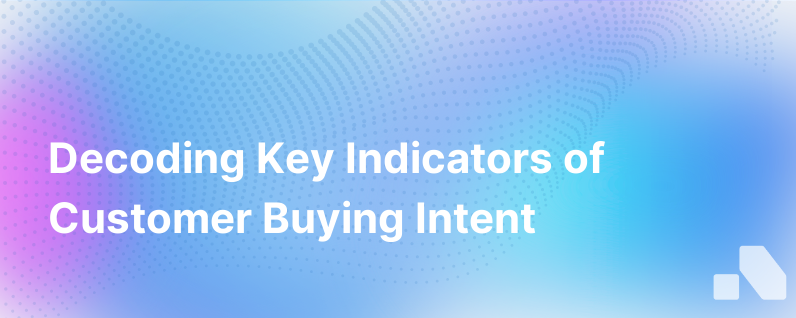
Indicators of buying intent are akin to modern-day alchemy for sales professionals—turning the base matter of customer interactions into the gold of closed deals. Surfacing these indicators equips sales reps with powerful insights, allowing for strategic engagement that is more likely to yield a positive outcome. Understanding and acting upon these signals can significantly streamline the sales process and enhance the efficiency of your sales funnel.
In a sales landscape increasingly dominated by savvy consumers and high competition, identifying intent signals is crucial. Let’s delve into the world of buying intent—the subtle (and not-so-subtle) signs that your prospects might be ready to take the leap from interested observers to paying customers.
Defining Buying Intent
Buying intent refers to the probability that a consumer will purchase a product or service. It’s determined by analyzing their behavior patterns and engagement levels. Technology has enabled the capture and analysis of digital footprints, which reveal a customer's potential interest in making a purchase. From web page views and download patterns to social media interactions, indicators of buying intent are numerous and vary in their predictive power.
Hard vs. Soft Indicators
Of the myriad signals available, they can be categorized into two broad types: hard indicators and soft indicators. Hard indicators are explicit actions that show a clear interest in purchasing, while soft indicators require more nuanced analysis and often relate to the potential customer’s attitude or level of engagement.
Hard Indicators of Buying Intent
- Direct Inquiries: When a prospect directly inquires about pricing, specific functionalities, or implementation, it’s a strong signal they are seriously evaluating your offering.
- Free Trials or Demos: A request for a demo or signing up for a free trial shows a higher level of engagement and a desire to understand the product more deeply.
- Repeated Site Visits: Multiple visits to your product pages or pricing information reflect an increased interest and likelihood to buy.
- Use of Specific Keywords: When prospects use keywords that reflect a deep understanding of the product or service, or are indicative of later-stage buying cycle research, it signals readiness to buy.
- Event Actions: Signing up for a webinar or attending an event demonstrates a commitment to learning more about your solution.
Soft Indicators of Buying Intent
- Content Engagement: If a prospect is regularly consuming your content, especially if it’s high-value content like case studies or white papers, it’s a good sign they are considering your offering in their decision-making process.
- Social Media Engagement: Sharing your content, asking questions on social media, or engaging in discussions about your brand suggest a level of interest that could convert to a sale.
- Email Interactions: Open and click-through rates in your email campaigns, especially for emails concerning product information or offers, can indicate buying intent.
- Behavioral Changes: A sudden spike in engagement, such as downloading multiple pieces of content in a short period, may signal a move towards a purchasing decision.
Process of Detecting Buying Intent
The process of discerning these intent signals often begins with data—collecting and analyzing interaction data across platforms to identify patterns and behaviors that correlate with purchases. AI and machine learning have drastically improved the predictive capabilities by digesting large data sets and illuminating the clearer paths customers take towards buying.
Leveraging Technology
Modern CRMs and marketing automation tools can track customer behavior across touchpoints, creating a cohesive view of engagement. They can alert sales teams to these signals, often using a lead scoring system that quantifies the potential intent to purchase based on defined criteria.
AI platforms, like Aomni, take this further by incorporating complex data analysis to offer real-time accounts, providing actionable competitive insights and personalized sales content. These insights are often derived not only from explicit behaviors but also by interpreting nuances of customer interactions—which can transform the approach and timing of sales strategies.
Strategic Response to Buying Intent
Identifying intent signals is only half the equation—the other half is how you respond to them. When these indicators surface:
- Prioritize and Personalize: Move leads showing strong buying intent up the priority list and tailor your communications to meet their specific interests and needs.
- Engage with Relevance: Use the information derived from their behavior to engage in a way that resonates with the buyer's journey they are on.
- Swift Follow-up: Immediate and relevant follow-ups to hard indicators of buying intent can be the difference between winning or losing a sale.
- Refine the Experience: Soft indicators should inform how you refine the ongoing nurture process, keeping your brand top-of-mind for when the prospect is ready to buy.
The Importance of Timeliness
Reacting promptly to buying signals is critical. Delayed response not only risks losing a deal but can also negatively impact the customer experience. Prospects expect businesses to be attentive and responsive, especially when they exhibit clear interest.
Aomni: A Powerful Ally in Identifying Buying Intent
For B2B sales platforms like Aomni, streamlining the identification of buying intent signals is a core value proposition. With its advanced AI capabilities, Aomni uncovers real-time research and insights, providing timely, personalized, and easily actionable content for sales professionals to utilize in closing deals.
By integrating platforms like Aomni, businesses gain an edge in efficiently capturing and acting on the treasure trove of intent data, allowing for strategic engagements poised at turning prospects into long-term valuable customers. Using such tools strategically and responsively transforms intent signals into successful conversions.